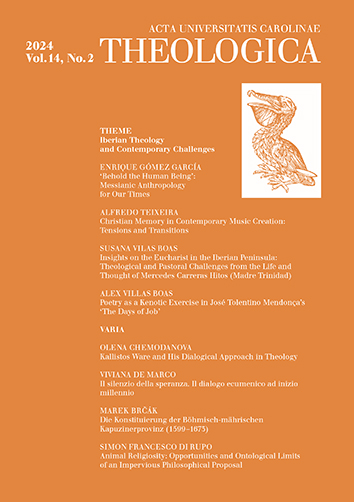AUC Theologica is a peer-reviewed journal for theology published twice a year. As we publish original papers in English, German, French, and Italian, our mission is to serve as a platform both for Czech researchers, who can present their research results in these languages, and for international contributors, who are invited to enter the academic theological discussion in the heart of Europe.
The journal focuses on a wide range of theological disciplines, such as systematic theology, biblical studies, patristic studies, pastoral and spiritual theology, religious education, church history, etc. Within these fields, the journal seeks to reflect the current theological questions and problems, which often requires interdisciplinary approaches. Supporting the intersection of various theological disciplines, we thus also welcome theological papers touching other academic fields including philosophy, sociology, literary studies, and science.
Each issue consists of two sections. The thematic section presents papers of the same focus. The section called ‘Varia’ invites papers dealing with various theological themes from the perspective of all Christian traditions. Our current and past issues are approachable for free on this website in the form of Open Access.
AUC THEOLOGICA, Vol 2 No 2 (2012), 35–57
Kritéria recepce II. vatikánského koncilu
[Criteria for the reception of the Vatican Council II]
Peter Hünermann
DOI: https://doi.org/10.14712/23363398.2015.40
published online: 05. 12. 2012
abstract
Criteria for the reception of the Second Vatican Council have to be manageable for broad segments of the population and not just for scholars. The reception plays a role on many different levels and is being effected by very different protagonists. For this reason four documents are singled out here, each of which bids farewell to historical forms of faith and church life and initiates the emergence of new forms: 1. With the Declaration on Religious Freedom leave is taken from the statechurch system which existed for 1500 years. What new form is emerging? 2. With the Decree on the Catholic Churches of the Eastern Rite and Unitatis Redintegratio the 1000-year split into an Eastern and a Western Church is rejected and the departure from a mono-cultural understanding of the faith and of the church is announced. 3. I n the Decree of Ecumenism t he emergence f rom a denominationalecclesiastial system is achieved. 4. T he Pastoral Constitution on the Church in the Modern World represents the overcoming of the hesitation on the thresholdk of the modern age, a characteristic of the First Vatican Council which lasted about 100 years. In the closing reflections the texts of the Second Vatican Council are recognized as constitutional texts. They mark cornestones of a ‘constitution’ of the church in the modern age. The current crisis is one moment in the major transformation process that is under way.
keywords: Vatican Council II; Dei Verbum; Dignitatis Humanae; Nostra Aetate; Unitatis Redintegratio

Kritéria recepce II. vatikánského koncilu is licensed under a Creative Commons Attribution 4.0 International License.
148 x 210 mm
periodicity: 2 x per year
print price: 100 czk
ISSN: 1804-5588
E-ISSN: 2336-3398
